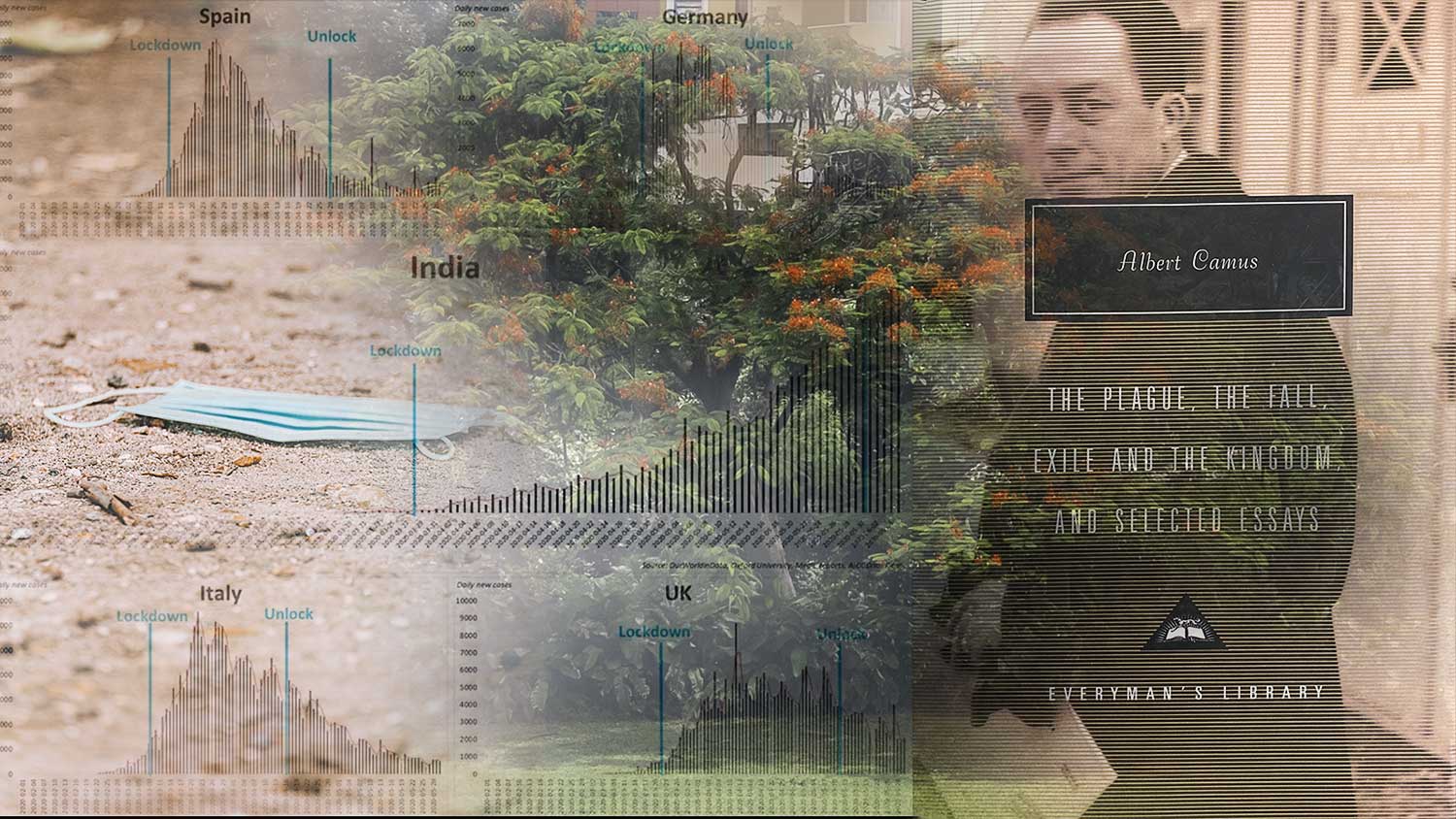Not Feeling Pain for the Corona Victims
The daily figures of those fallen to corona look like scores in cricket — a game I understand but don't follow. I read the statistics without emotion.

My window at work looks out to the front lawn, on which a flagstone-covered pathway flanked by cypress and frangipani leads out to the compound wall. Along the wall, a line of Gulmohar trees helps take attention away from the wall to fiery flowers above. The red flowers are still raging, now in rainy June. One tree has fallen, brought down by gusty winds that come every afternoon these monsoon days. The tree is being cut up at leisure — there's no hurry these days, during the reign of the coronavirus. The massive dismembered tree is covered and honoured by its own still-bright flowers.
It is quiet in our campus, only half the strength works on site. Outside, in the offices of the software behemoths who have a huge presence here in Electronics City, the percentage of onsite personnel is even fewer — they have almost everybody working out of home, people say they'll keep it that way until year's end.
In this silence, the dead tree is a poignant sight, but it won't be terribly missed. The survivors preserve the pleasing sight, and these days it is possible to transplant a well-grown tree in place of the departed.
As I gaze at the sight and feel sadness for the one deceased creature, there's the day's news knocking on my mind. Nearly a half-million lives are taken so far by the virus; it is at work on another eight million; no one knows what the final tally could be. I wonder that the monstrous tragedy behind these numbers doesn't strike me. I am unaffected by the individual pain, the collective suffering, the anguish of the bereaved. The daily figures of those fallen to corona look like no more than scores in cricket — a game I understand but don't follow. I read the statistics without emotion. My responses don't go beyond business continuity and the survival of my folks and me. (I've contributed some money for rations and stuff, just as others have.)
However, the plight of the immigrants has caused me dismay. And I'm outraged at the continued shortage of beds and aids and the general lack of preparedness that the newspapers report. But these are things beyond my influence. I haven't figured out where I could be during this trying time. Still, I see I'm not unlike most others whom I encounter, in real life, or online. I haven't met other, really empathetic people yet. Most folks I know are taking this pandemic and its effects rather easy.
Through last week, I read *The Plague* by Camus. Set in a coastal town in Algeria, the story begins one April with rats skittering up from the gutters, turning over, and dying. Soon, humans start to fall as well. During the months that follow, the epidemic takes away hope, erases consciousness of past and future, rouses selfless action, sees quiet sacrifice, draws compassion, moves men to scheming and intriguing, beats them into indifference, turns them unto themselves to reflect on love and loneliness deriving from their sealed-off life, while all around, people continue to catch the disease and die. And, when the crushed populace has altogether stopped anticipating it, the plague goes into complete remission. The town waits another month; then it opens its gates and calls for celebrations.
Here's the last line in the book:
… that the plague bacillus never dies or disappears for good; that it can lie dormant for years and years in furniture and linen chests; that it bides its time in bedrooms, cellars, trunks and bookshelves; and that perhaps the day would come when, for the bane and the enlightening of men, it roused up its rats again and sent them forth to die in a happy city. (The Plague, Albert Camus)
In the first half of the last century, there was the Spanish Flu; in the latter half of that century, there was rabid consumerism. About the same time a century later, we have Covid-19, and its cousins, and we don't know yet whether the virus will leave on its own, or if we'll drive it out with cures and prophylactics. Plague and pestilence aren't new to humans, we've had them coming and going as they've liked, since the very beginning, and through the ages. They have wiped out entire villages and a good part of great cities during their visitations — the Great Plague of London, for example.
The virus has been growing in sophistication while we've been busy making a village of the globe. The microbe now challenges the whole planet. Right this day, it has rallied and mounted a repeat attack on Beijing, before China has recovered from the assault just ended. All this is happening in the first half of this century. When the virus leaves — of its own volition or overcome with medicine — would humanity be changed, and boldly so? Or, is it more likely that we will carry on with our mistakes as in centuries past?
Photo of Mask in Collage: Robin Benzrihem, Unsplash
